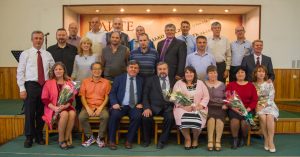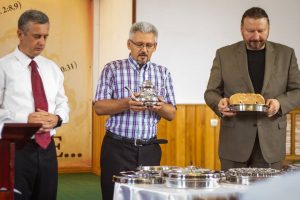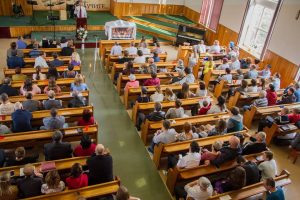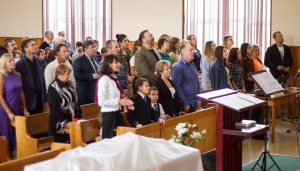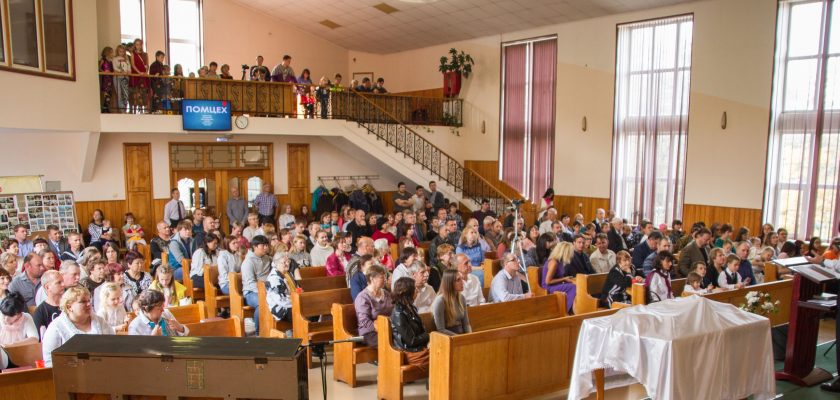Only recently, we have marked the 20th anniversary of PAMCEC – Primorsky Association of Missionary Churches of Evangelical Christians.
The missionary work in Primorsky Krai, which is one of the least evangelized regions of Russia, had been started in 1990 by ministers of Light of the Gospel (the first missionary entity in the former Soviet Union, established in 1989).
As soon as the doors were opened for free preaching of the gospel in the USSR, several brothers, who previously had spiritual fellowship and corporate prayers for it, have raised one serious question before themselves: “What does the Lord want from us? What should we do in our new circumstances”? Back then, we discussed for the first time about this work – mission. It did not take long for everyone to accept this idea, and this had immediately stirred a response in us that we should start a mission. Of course, the primary concern of it was to proclaim the gospel wherever we could, and eventually to plant new churches.
The missionary work has begun from the point of building a close relationship with those people who already left for missionary service long before existing of such an organizations. They were offered a spiritual, and after a while material support. In a short period of time there were many people who agreed to leave their homes and preach the gospel elsewhere. Over the years of functioning the missionary department of Light of the Gospel, there were planted around 60 churches.
Due to the collapse of the Soviet Union and reorganization of the MO Light of the Gospel, its missionary department became an independent organization – the Christian Community “Missionary Fellowship,” which in 1996, was renamed as the International Public Charitable Christian Organization Hope to People.
When the missionary work began in Primorye, the local evangelical communities were not engaged in planting new churches (there were only small groups or individual believers who did not cease praying for revival in their region), and there also existed just relatively small amount of Orthodox churches. But within a very short time, God had used many missionaries from Ukraine and Belarus, and blessed them to establish new evangelical, mission-minded churches in Vladivostok, Arsenyev, Dalnegorsk, Fokino, as well as in the settlements: Chuguevka, Novosysoevka, Yakovlevka, Kavalerovo, Olga, and others.
Back in those days, the very first missionaries were: Pavel Yakovenko (Kiev), Alexander Barchuk (Kiev), Sergey Omelyanchuk (Brest). While living in Chuguevka, Pavel Yakovenko led small groups of the Bible study in Chuguevka, Kavalerovo, Dalnegorsk, and actively participated in outreach events in Novosysoevka, Olga. Alexander Barchuk carried out a missionary work in Ussuriysk. In 1991, Sergeiy Omelyanchuk began his ministry in Vladivostok.
As time went by, more new people started appearing in these newly planted churches who eventually had come to know Christ and became mature Christian-missionaries. Most of the local ministers received a spiritual education in a biblical school studying by extension. The school was established in cooperation with the Krasnodar College Lampados and functioned in Primorye since 1995. Later, this school had been turned into a Primory Bible seminary. Up to 2010, there were105 students who received a biblical education, and many of whom serve today as a pastors in the churches of our association, some of them have moved elsewhere. There are also ministers of youth ministry and children’s Sunday schools.
Since 1994, there had been started a specific work geared for helping churches to become one-minded and united, because the churches were totally alienated from each other, they did not have any relationships, and it was extremely hard to carry out missionary tasks apart from others. To this end, missionary Yury Morokhovets had been sent to Primorye, who later offered to organize the association of churches. During 14 years, Yury spearheaded the Primorsky Association of Missionary Churches of Evangelical Christians. Now the Association is headed by Oleg Getun.
The main purpose of PAMCEC was to bring all Christian of Primorye together for collaborative efforts in order to carry out the Great Commission of Jesus Christ, as well as for mutual support in upbuilding, developing and multiplying new churches. On May 31, 1997, there was held a constituent meeting dedicated to the establishment of the association. Yury Morokhovets shares: “The association was officially registered in 1999, as the result of the issue of a new law on freedom of religion and religious associations. For two years, we desperately looked for documents in state archives that would confirm the existence of the Evangelical Christians in Primorsky Kray for the last fifteen years. I found the documents in the archive about the existence of Evangelical Christians back in 1921. These documents gave us the legal right to register as a centralized organization on the basis of the existed law. The founders were three local churches of Vladivostok, Chuguevka and Kavalerovo. All the rest had joined to the established centralized organization on the basis of the law.
The activity of PAMCEC was based on the fundamental principles, most of which are listed below.
Principle of Mobilization:
All members of the Body of Christ, which are united by the ministry and leadership in the local church, in the whole Association, admit that the fulfillment of the Great Commission of Jesus Christ is the highest priority and responsibility, both before the Lord and the perishing world.
Principle of Unity:
The Primorsky Association of Missionary Churches of Evangelical Christians (hereinafter PAMCEC) is an integral movement that is united by four features:
– Unity in purpose;
– Unity in the doctrine (the principle of service);
– Unity in leadership;
– Unity in the missionary fund.
Principle of Training:
For the creation and formation of one hundred new missionary churches, at least three hundred trained workers are needed.
Elisha, John the Baptist, Jesus Christ, Paul showed the way – discipleship.
Discipleship is the rule for all:
– Church training – a program of in-church education, Bible classes, seminars, individual discipling;
– Full-time or online training is called upon to raise the spiritual and theological level of all ministers;
– Bible schools and Bible colleges;
– Seminaries.
Principle of Commitment:
Each local church hosts an annual missionary conference to call for personal commitment to missionary work.
Local churches also devote themselves to the goals and tasks of PAMCEC.
Principle of Proliferation:
All leaders of small groups, church ministers, workers of the association – work on the principle of internship. Home churches are doubled down. The formed churches self-produce themselves in the affiliated churches.
Principle of Communal Solidarity:
– In the solution of the major questions;
– In the determination of the objectives and tasks of the PAMCEC;
– In the approval of the leaders;
– In the authority of laws (or the constitution), rather than in the authority of individuals in leadership.
The main activities of the association had become – planting of new evangelical churches, the involvement of existing churches in missionary service, assistance in the spiritual growth and strengthening of the material and technical base of churches, spiritual education, spiritual and educational work, outreach work, children evangelism, social service.
By the grace of God, the organization successfully achieves its goals.
Key achievements in recent years include – the training of new ministers, the development of work with children, the acquisition of premises for a number of churches, the development of missionary work.
In 2007, the work was conducted in 33 cities and towns of Primorsky Krai. At the present time, the Association comprises of13 registered churches, as well as 5 groups for planting the new ones. By February 2017, the number of members of the churches in the PAMCEC constituted 577 people.
There are, of course, fails and weaknesses in the work of the association. For example, there is the lack of sufficient financial resources, and because of this fact, there is also a staff shortage in the administrative and economic apparatus. Most churches carry out their ministry in rented premises and because of this, there are a massive overhead expenditures and the lack of opportunities to fully implement their programs. Churches have a relatively brief history, so the church leaders and church councils do not always consist of mature people, which can create its challenges.
PAMCEC uses various programs in its work. One of them is the exhibition of paintings “The Life of Jesus Christ,” which has already taken place in dozens of towns and villages of Primorye and has proved itself as a very good way of evangelism. In the framework of the PAMCEC, there are held missionary and youth meetings, seminars for Sunday school teachers, summer children’s and youth Christian camps (Hope and Transfiguration), as well as in ten churches were organized Avana clubs. Since 2001, in cooperation with the MC Light in the East, on the basis of the journal “Faith and Life” for seven years in a row is held the correspondent course “Being a Christian.” The camp Hope annually gathers more than 100 children in the summer time only.
There is also a practice of conducting missionary conferences with the adoption of “commitment of faith.” In 1997, a missionary fund was created to support and develop missionary service in PAMCEC. Back then, with the help of the Mennonite Central Committee, had been started a social work: providing material assistance to the poor, in particular to orphans in orphanages.
In relation to the development of the ministry and the increase in the volume of work in 2003, Primorye was conditionally divided into three regions: southern, central and northern. The PAMCEC Council has put in charge the pastors who are responsible for the development of the work in each of the regions: Vasily Kirichenko – pastor of the CEC Living Source, Bolshoy Kamen town – southern region; Yevgeny Smirnov – pastor of the CEC in Arsenyev – the central region, Mikhail Kucherenko – pastor of the CEC New Life, Vladivostok – the northern region.
The PAMCEC seeks to encourage the churches at least once a year, and at its best, twice a year, as well as to hold youth conferences and meetings for ministers. In 2013, there were organized family conferences in Vladivostok and Kavalerovo, where the biblical principles of family-related issues were clearly expounded. This was a great blessing for all Christians, considering that there are a lot of divorces in the Primorsky Territory, and some churches are filled with people who are remarried, and are in great need of healing, strengthening and instruction. In the same year, in Vladivostok and Khabarovsk, there was also started a training under the program of the International Institute of Biblical Counseling. In total, there were trained around 140 people.
Since 2014, up until the present time, during the autumn events, the Festival “Colors of Autumn” is held in the framework of the events of PAMCEC. In Spassk-Dalniy, Kavalerovo, Vladivostok there are mass street events (contests, songs, quizzes, relay races, etc.).
Beyond that, in 2013, there was a missionary conference dedicated to the ministry of evangelism to unreached people groups. Over the past 7 years, many different trips have been made to hard-to-reach places, where there are people who need Christ. In 2014, on the initiative of Yury Morokhovets, a team of brothers from the Prymorsk’s churches began to travel to the remote areas where endangered people groups live. For three years, the brothers were translating 25 Bible audio stories in collaboration with the Wycliffe Bible Translators. In 2017, two brothers made a decision and then moved to Udege village to plant a new church there. And in August there was held the first baptism service.
In 2017, the ninth congress of Evangelical Christians of Primorye took place, which was dedicated to the 500th anniversary of the Reformation.
For the last several years, the education is actively developing: School of Bible Preaching, Institute of Biblical Counseling, School of Evangelism, and School without Walls.
In the churches of PAMCEC, the social service continues to expend. It is actually comprehensive: it varies from the passing of clothing and footwear to the poor residents of villages and towns, to the formation and distribution of New Year’s gifts to children…
Some church ministers took responsibility for the organization of custodial families, for example, the Zimin’s family having five of their own children, assumed the guardianship over 7 other children, as well as the Gvozdenko’s family took custody of the three children, having their own five.
Within the framework of public service, the personal social service is also gaining momentum. Members of churches make decisions on their own and then go to hospitals as volunteers trying to help seriously sick patients. They seize an opportunity to render help and communicate with people who will soon undergo a surgery. They also pay visits in nursing homes, boarding schools, orphanages. While carrying out this volunteer service, they bear witness to these people and share about Christ. Mostly in this ministry, are involved the young people. By the way, I want to say that the youth ministry is gaining momentum, too, and as a result a new generation appears in the churches…
Throughout the entire period of its existence, PAMCEC continued to closely cooperate with the IPO Hope to People. At present, the relationship between Hope to People and PAMCEC is defined as a relationship of strategic partnership.
We’d like people to pray with us for:
– Unity between the churches.
– Practical return to the values and strategies that were adopted when creating the association.
– Development of the ministry and organization of the church among a small number of Udege people group.
– Restoration of work in the city of Nakhodka.
Tatyana Arterchuk, Lyudmila Gritsaenko
